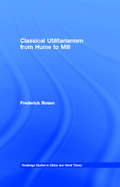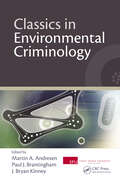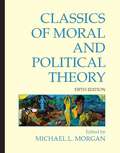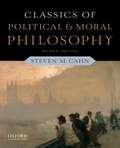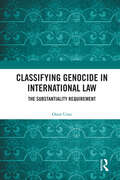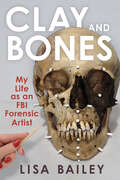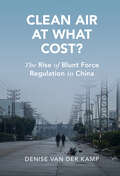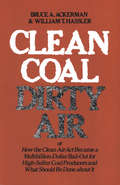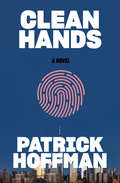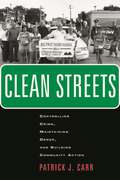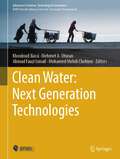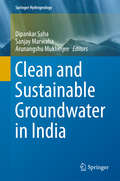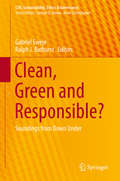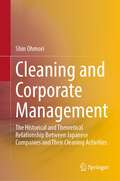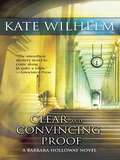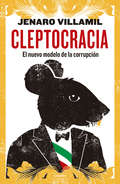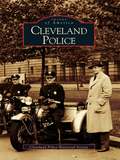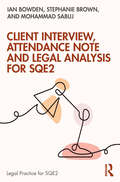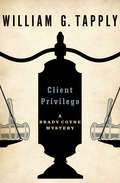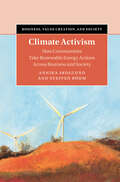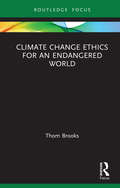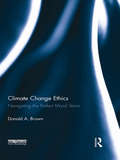- Table View
- List View
Classical Utilitarianism from Hume to Mill (Routledge Studies in Ethics and Moral Theory #Vol. 2)
by Frederick RosenThis book presents a new interpretation of the principle of utility in moral and political theory based on the writings of the classical utilitarians from Hume to J.S. Mill. Discussion of utility in writers such as Adam Smith, William Paley and Jeremy Bentham is included.
Classics in Environmental Criminology
by Martin A. Andresen J. Bryan Kinney Paul J. BrantinghamA careful analysis of environmental factors is key to understanding the causes of crime, to solving crimes, and eventually helping to predict and prevent them. Classics in Environmental Criminology is a comprehensive collection of seminal pieces from legendary contributors who focus on the role that the immediate environment plays in the occurrence
Classics of Criminology (Fourth Edition)
by Joseph E. Jacoby Theresa A. Severance Alan S. Bruce"This inclusive collection is organized into three sections, each of which opens with a brief editorial introduction to provide context. Section I, The Classic Descriptions of Crime, contains writings whose primary contribution is descriptive, although they also offer important theoretical insights. These works illuminate with great clarity certain aspects of the phenomenon of crime. Section II, Theories of Causation of Crime, covers over two centuries of theorizing about the causes of crime. Most of these writings are specifically about crime, although some emphasize larger social issues that have direct implications for criminology. Section III, The Social Response to Crime, includes writings that variously describe, theorize about, or advocate specific social responses to crime.
Classics of Moral and Political Theory
by Michael L. MorganThe fifth edition of Michael L. Morgan's Classics of Moral and Political Theory broadens the scope and increases the versatility of this landmark anthology by offering new selections from Aristotle's Politics, Aquinas' Disputed Questions on Virtue and Treatise on Law, as well as the entirety of Locke's Letter Concerning Toleration, Kant's To Perpetual Peace, and Nietzsche's On the Advantage and Disadvantage of History for Life.
Classics of Political and Moral Philosophy
by Steven M. CahnClassics of Political and Moral Philosophy provides in one volume the major writings from nearly 2,500 years of political and moral philosophy, from Plato through the twentieth century. The most comprehensive collection of its kind, it moves from classical thought (Plato, Aristotle, Epicurus,Cicero) through medieval views (Augustine, Aquinas) to modern perspectives (Machiavelli, Hobbes, Spinoza, Locke, Rousseau, Hume, Adam Smith, Kant). It includes major nineteenth-century thinkers (Bentham, Hegel, Mill) and considerably more twentieth-century theorists than are found in competingvolumes (Rawls, Nozick, Taylor, Foucault, Habermas, Held, Nussbaum). Also included are numerous essays from The Federalist Papers and a variety of notable documents and addresses, among them Pericles' Funeral Oration, The Declaration of Independence, The Constitution of the United States, The Declaration of the Rights of Man and of the Citizen, and speeches by EdmundBurke, Abraham Lincoln, Elizabeth Cady Stanton, John Dewey, and Martin Luther King, Jr. The readings are substantial or complete texts, not fragments. The second edition contains two new readings - by Charles Taylor and Virginia Held - and adds The Universal Declaration of Human Rights. It alsopresents two works by John Locke in their entirety and includes a new translation of Kant's Groundwork for the Metaphysics of Morals. An especially valuable feature of this volume is that the writings of each author are introduced with a substantive and engaging essay by a leading contemporary authority. These introductions include Richard Kraut on Plato, Aristotle, Epicurus, and Cicero; Paul J. Weithman on Augustine and Aquinas;Roger D. Masters on Machiavelli; Jean Hampton on Hobbes; Steven B. Smith on Spinoza and Hegel; A. John Simmons on Locke; Joshua Cohen on Rousseau and Rawls; Donald W. Livingston on Hume; Charles L. Griswold, Jr. , on Smith; Bernard E. Brown on Hamilton and Madison; Jeremy Waldron on Bentham and Mill;Paul Guyer on Kant; Richard Miller on Marx and Engels; Thomas Christiano on Nozick; Robert B. Talisse on Charles Taylor; Thomas A. McCarthy on Foucault and Habermas; Cheshire Calhoun on Held; and Eva Feder Kittay on Nussbaum. Offering unprecedented breadth of coverage, Classics of Political and Moral Philosophy, Second Edition, is an ideal text for courses in political philosophy, social and political philosophy, moral philosophy, or surveys in Western civilization.
Classified
by Christopher MoranClassified is a fascinating account of the British state's long obsession with secrecy and the ways it sought to prevent information about its secret activities from entering the public domain. Drawing on recently declassified documents, unpublished correspondence and exclusive interviews with key officials and journalists, Christopher Moran pays particular attention to the ways that the press and memoirs have been managed by politicians and spies. He argues that, by the 1960s, governments had become so concerned with their inability to keep secrets that they increasingly sought to offset damaging leaks with their own micro-managed publications. The book reveals new insights into seminal episodes in British post-war history, including the Suez crisis, the D-Notice Affair and the treachery of the Cambridge spies, identifying a new era of offensive information management, and putting the contemporary battle between secret-keepers, electronic media and digital whistle-blowers into long-term perspective.
Classifying Genocide in International Law: The Substantiality Requirement
by Onur UrazThis book offers an in-depth examination into genocide law by focusing on one of the lesser examined, yet practically significant, issues: the ‘substantiality requirement’. This refers to the requirement in international law that intended destruction should be directed towards a ‘substantial’ part of a protected group in order for an atrocity to qualify as genocide. This comprehensive and detailed study draws connections between different judicial approaches to ‘substantiality’ and the varying theoretical presumptions about the constitutive concepts of the crime. This prima facia doctrinal problem is used as a springboard to scrutinise the broader theoretical problems underlying the legal conceptualisation of genocide. The book systematically explores how the individualistic and collectivistic conceptions of the crime have been able to co-exist in case law and how the different approaches to assessing substantiality have played a backdoor role between these two conceptions. The work demonstrates that these two philosophical standpoints are far from effectively representing the reality of the protected groups and fully explaining the harm inherent to group destruction. The book revisits the recent philosophical and sociological studies on the crime and, considering ideas from the emerging ‘relational approaches to genocide’, offers a third way to understand the existing legal representation of the crime and, consequently, the idea of ‘substantiality’. It demonstrates the practical significance of its theoretical debates and applies its novel perspective through a case study on South Sudan. This book will be highly useful to students and scholars with an interest in genocide studies, international criminal law and legal theory. It will also be of interest to policymakers engaged with issues around genocide.
Clay and Bones: My Life as an FBI Forensic Artist
by Lisa G. BaileyTold with unflinching honesty and a touch of gallows humor,Clay and Bonesis the personal memoir of the first female forensic sculptor in the FBI. Lisa Bailey never considered a career working in death until she saw the FBI job posting for a forensic artist. The idea of using her artistic skill to help victims of crime was too compelling to pass up. Soon she was documenting crime scenes, photographing charred corpses, and digitally retouching the disembodied heads of suicide bombers. But it was facial approximation—sculpting a face from the remnants of an unidentified victim's skull—that intrigued her the most. Bailey knew that if she could capture that person's likeness in clay, she just might help them be identified, and that might help law enforcement track down their killer. Bailey worked on hundreds of cases and grew to become a subject matter expert in the field. It was the most challenging and fulfilling work she could have imagined, and she never thought of leaving. But her life changed when she became the target of sexual discrimination and harassment. She was stunned when FBI management protected the abusers and retaliated with threats, slander, and an arsenal of lawyers. Trapped in an increasingly hostile work environment, and infuriated at the hypocrisy of the FBI's tactics, Bailey decided to fight back.Clay and Bones is a memoir with a mission, and a fascinating exploration into the surreal and satisfying work of a forensic artist.
Clean Air at What Cost?: The Rise of Blunt Force Regulation in China (Cambridge Studies in Law and Society)
by Denise Sienli van der KampChina's green transition is often perceived as a lesson in authoritarian efficiency. In just a few years, the state managed to improve air quality, contain dissent, and restructure local industry. Much of this was achieved through top-down, 'blunt force' solutions, such as forcibly shuttering or destroying polluting factories. This book argues that China's blunt force regulation is actually a sign of weak state capacity and ineffective bureaucratic control. Integrating case studies with quantitative evidence, it shows how widespread industry shutdowns are used, not to scare polluters into respecting pollution standards, but to scare bureaucrats into respecting central orders. These measures have improved air quality in almost all Chinese cities, but at immense social and economic cost. This book delves into the negotiations, trade-offs, and day-to-day battles of local pollution enforcement to explain why governments employ such costly measures, and what this reveals about a state's powers to govern society.
Clean Coal/Dirty Air
by Bruce Ackerman William T. HasslerA path-breaking effort in constitutional theory which brings a new clarity to the interpretation of the Fifth Amendment's just compensation clause. Essential reading for lawyers concerned with environmental regulation or the general development of constitutional doctrine.
Clean Hands: A Novel
by Patrick HoffmanA New York Times Book Review Summer Thriller Pick. &“Keep your eye on Patrick Hoffman—he&’s got the right stuff.&”—James Carlos Blake Corporate lawyer Elizabeth Carlyle is under a lot of pressure. Her prestigious New York law firm is working on the most high-stakes case in company history, defending a prominent bank. When Elizabeth gets the news that one of her junior associates has lost his phone—and the secret documents that were on it—she needs help. Badly. Enter ex-CIA officer Valencia Walker, a high-priced fixer who gets called in when governments, corporations, and plutocrats need their problems solved discretely. But things get complicated when the missing phone is retrieved: somebody has already copied the documents, and now they&’re blackmailing the firm. When the situation gets murkier still—hinting that darker forces may be churning below the surface—Elizabeth and Valencia must maneuver and outmaneuver whomever is behind this, and, most importantly, keep their hands clean. This is a world of private security, private diplomacy, and private justice. A sharply drawn cast of characters—dirty lawyers, black-market traders, Russian criminals, and extra-judicial actors, all take part in this breakneck tour through New York. Authentic, tense, and impossible to put down, Clean Hands gives a vivid look at the connections between corporations, government, and the underworld. &“It becomes increasingly clear that the whole thing is far more complicated, with much higher stakes, than most of the pawns in this grand chess game understand. The fun is in the details.&”—The New York Times Book Review
Clean Power Politics
by Joseph P. TomainThe United States has been experiencing an energy transition for over four decades, and now - thanks to the Clean Power Plan of the Obama Administration and the Paris climate agreement - a clean energy future is moving closer to reality. In Clean Power Politics, Joseph Tomain describes how clean energy policies have been developed and, more importantly, what's necessary for a successful transition to a clean energy future, including technological innovation, new business models, and regulatory reforms. The energy system of the future will minimize the environmental costs of traditional energy production and consumption, and emphasize expanded use of natural resources and energy efficiency. Because many new energy technologies can be produced and consumed at smaller scales, they will shift decision-making power away from traditional utilities and empower consumers to make energy choices about consumption and price. In this way, a clean energy future embodies a democratization of energy.
Clean Streets: Controlling Crime, Maintaining Order, and Building Community Activism (New Perspectives in Crime, Deviance, and Law #8)
by Patrick J. CarrWith the close proximity of gangs and the easy access to drugs, keeping urban neighborhoods safe from crime has long been a central concern for residents. In Clean Streets, Patrick Carr draws on five years of research in a white, working-class community on Chicago’s South side to see how they tried to keep their streets safe. Carr details the singular event for this community and the resulting rise of community activism: the shootings of two local teenage girls outside of an elementary school by area gang members. As in many communities struck by similar violence, the shootings led to profound changes in the community's relationship to crime prevention. Notably, their civic activism has proved successful and, years after the shooting, community involvement remains strong.Carr mines this story of an awakened neighborhood for unique insights, contributing a new perspective to the national debate on community policing, civic activism, and the nature of social control. Clean Streets offers an important story of one community's struggle to confront crime and to keep their homes safe. Their actions can be seen as a model for how other communities can face up to similarly difficult problems.
Clean Water: Next Generation Technologies (Advances in Science, Technology & Innovation)
by Ahmad Fauzi Ismail Mohamed Mehdi Chehimi Mehmet A. Oturan Khouloud JlassiThis book summarises the recent, and future, sustainable, low-cost, environment-friendly and efficient systems for clean water production, to solve clean water crisis. We cover production of water the dew and rain or via desalination, Fenton processes or electrocoagulation; nanomaterial-based water purification methods including adsorption, catalysis, smart-sensors for pollutants detection and removal. We also cover environmental management, environmental policy aspects, and review recent patents and industrial processes to produce clean water. Written by experts in the domain of wastewater treatment, production of clean water and environmental management, this new book will be a unique tool for experts and students. We anticipate it open new horizons in clean water production and will be a source of inspiration for next generations of clean water technologies researchers
Clean and Sustainable Groundwater in India (Springer Hydrogeology)
by Dipankar Saha Sanjay Marwaha Arunangshu MukherjeeThe book embodies the groundwater issues and challenges in India focusing its sustainable use. It is a compilation of papers presented by the eminent experts from Government departments, academia, research institutes, NGOs and stakeholders who assembled at Kurukshetra on 21st August, 2015 in the event of Bhujal Manthan or "Churning of Groundwater" organized for the first time by Ministry of Water Resources, River Development and Ganga Rejuvenation, the apex Ministry of Water Resource under Government of India. India, as a country, is the highest groundwater extractor in the world. Its service towards attaining the food and clean drinking water security is well documented. This volume addresses the issues of aquifer characterization, groundwater contamination, groundwater resource availability and its sustainable management through community participation in pan-India scenario. This book provides a unique opportunity for its readers to understand groundwater domain in India in its entire gamut. The papers included in the volume were selected carefully from the presentations made in the following four broad topics during the Manthan; (i) groundwater quality, (ii) conjunctive use of surface and groundwater, (iii) management intervention and sustainable use of this resource, and (iv) groundwater problems and application of various techniques. The book contains 20 papers including an introductory chapter by the editors. The content of the book is enriched by contributions from eminent researchers and activists in groundwater domain, like Prof. Tushar Shah, Prof. Himanshu Kulkarni, Dr. D. K. Chadha, Dr. Bharat Sharma and others. The recommendations in the individual papers are of immense significance for keeping the groundwater of the country clean and sustainable. The volume will help the readers to understand the groundwater issues of the country and also assist policy makers to prepare strategies for its better governance and management with environmentally sustainable ways.
Clean, Green and Responsible?: Soundings from Down Under (CSR, Sustainability, Ethics & Governance)
by Gabriel Eweje Ralph J. BathurstNew Zealand and Australia are broadly considered to be countries in which sustainability and responsibility discourses are being pursued by governments and business alike, and in which incentives and initiatives are helping confront and overcome sustainability-related challenges. This book takes a closer look behind and beyond the marketing mantras of both Australia’s and New Zealand’s “clean and green” campaigns and, on the basis of representative examples and cases, critically evaluates the status quo.The book assesses the effectiveness of sustainability and responsibility models with a focus on the South Pacific and argues that the ways in which issues have been dealt with in this more closely defined geographical region are most likely a good indicator of how similar issues are (or soon will be) dealt with around the globe. As such, the book offers a rich source of cases on sustainability and responsibility in the business arena, a critical review, and an inspirational affirmation of responsible business practice.
Cleaning and Corporate Management: The Historical and Theoretical Relationship Between Japanese Companies and Their Cleaning Activities
by Shin OhmoriThis book provides a new way of understanding Japanese management by focusing on the relationship between Japanese companies and their social practices. Whereas previous studies have often concentrated on the uniqueness of Japanese companies' systems (e.g., lifetime employment, the seniority system, company-specific unions) or methods (e.g., bottom-up management, Toyota production methods), this book explains the uniqueness of Japanese companies’ activities and practices. It especially highlights the day-to-day cleaning activities that many companies have practiced for numbers of years, regardless of their size or industry. Activities that continue beyond a certain period of time are called social practices, and the book clarifies how this particular social practice has historically been formed in Japanese companies and then shows what it means to keep cherishing those cleaning practices. This study consists of two parts: historical research and theoretical research. The historical research sheds light on the relationship between Japanese companies and cleaning activities from a historical point of view. On the basis of old literature and in-house documents, the reader can understand how Japanese companies have positioned cleaning practices in the process of increasing their growth potential and competitiveness and in maintaining their businesses. The second part explains theoretically the relationship between cleaning and management with quantitative and qualitative data from Japanese companies today. Using survey results from Japanese companies, the book shows what kinds of organizations will be formed and human resources will be developed if companies have been focusing for many years on 5S activities—Sort, Set in Order, Shine, Standardize, and Sustain— that include cleaning. This part of the book presents the distinctive problem-solving and strategy-creation processes of Japanese companies in contrast to the activities of European and American companies.
Clear and Convincing Proof
by Kate WilhelmThe Kelso/McIvey rehab center is a place of hope and healing for its patients--and for the dedicated staff who volunteer there. But David McIvey, a brilliant surgeon whose ego rivals his skill with a scalpel, wants to change all that. His plan to close the clinic and replace it with a massive new surgery center--with himself at the helm--means that the rehab center will be forced to close its doors.Since he is poised to desecrate the dreams of so many, it's not surprising to anyone, especially Oregon lawyer Barbara Holloway, that somebody dares to stop him in cold blood. When David McIvey is murdered outside the clinic's doors early one morning, Barbara once again uses her razor-sharp instincts and take-no-prisoners attitude to create a defense for the two members of the clinic who stand accused. And in her most perplexing case yet, Barbara is forced to explore the darkest places where people can hide--the soul beneath the skin.
Cleptocracia: El nuevo modelo de la corrupción
by Jenaro VillamilESTÁBAMOS A UN PASO DEL ABISMO...Y DIMOS UN PASO ADELANTE. Esta frase, atribuida a decenas de políticos, se convirtió en realidad: en México, la corrupción era ya catastrófica, y empeoró. "A diferencia de la mafia del poder, el término cleptocracia define una dinámica distinta: es la institucionalización del robo. La mafia del poder es descriptiva, la cleptocracia es prescriptiva. La mafia del poder captura al Estado, la cleptocracia se vuelve el Estado. La cleptocracia, a diferencia de la mafia, transforma lo que son bienes públicos en bienes privados. La corrupción en la cleptocracia no es la excepción, sino la regla, y no es una práctica ajena a la institucionalidad sino el hecho que explica su funcionamiento." -Jenaro Villamil/Introducción
Cleveland Police (Images of America)
by Cleveland Police Historical Society MuseumWhen Cleveland, Ohio, was incorporated as a city on March 5, 1836, the population numbered less than 6,000. In its heyday, the city was touted as the "Sixth City" when the population soared to 560,663. Today, the Cleveland Division of Police serves and protects 478,403 souls. Over the years, the division has been a pioneer in many aspects of policing, including criminal identification, scientific investigation, and communications. In the 1920s and 1930s, Cleveland had one of the most progressive and efficient departments in the country. The first use of a surveillance camera to identify bank robbers, which led to their quick arrest, occurred in Cleveland on April 12, 1957. However, the job of protecting and serving the people has never been easy--to date, 107 Cleveland police officers have died in the line of duty.
Client Interview, Attendance Note and Legal Analysis for SQE2 (The Skills of Legal Practice Series for SQE2)
by Stephanie Brown Mohammad Sabuj Ian BowdenClient Interview, Attendance Note and Legal Analysis for SQE2 is the latest title in a new series of books aimed at those preparing for SQE2, providing a comprehensive overview of everything you need to successfully pass the SQE2 advocacy assessment.This book explains the key principles of oral communication, interview technique, and legal analysis in a clear, concise, and easy-to-understand style. The use of practical examples, from the practice areas set out by the SRA assessment specification, allows such key principles to be effectively introduced and illustrated. The book demonstrates the importance of the three key tenets of listening, questioning, and advising, with a view to ensuring that a matter can be analysed effectively, and effective and appropriate decisions can be made. The book provides a clear and structured approach, with opportunities to apply the relevant principles to the law. Chapters include summaries, key practice cases, practice tips, and exercises to reinforce learning and understanding.Written by an author team with extensive experience in teaching and practice, this unique book will be essential reading for any candidate wishing to be fully prepared for their SQE2 assessment.
Client Privilege (The Brady Coyne Mysteries #9)
by William G. TapplyWhen someone tries to blackmail an old friend, Boston attorney Brady Coyne intervenes—only to wind up a murder suspect in this &“solidly appealing series&” (Publishers Weekly). Brady Coyne has known Chester &“Pops&” Popowski since law school. An honest, battle-hardened Massachusetts judge, Pops is more soldier than scholar—and has been known to defend what&’s right with his fists. After years on the bench, Pops has been nominated for a federal judgeship, with a possible Supreme Court appointment in his future. Only one thing stands in his way: blackmail. A TV reporter has evidence of a long-ago affair Pops conducted with a younger woman. Pops sends Brady, his genteel Boston lawyer, to tell the reporter he won&’t be getting any money. Soon after their meeting, the blackmailer is found dead. Brady refuses to name his client, and finds himself under suspicion of murder. Brady will do whatever it takes to keep Pops out of the papers. If he&’s lucky, he may even keep himself out of jail.
Climate Activism: How Communities Take Renewable Energy Actions Across Business and Society (Business, Value Creation, and Society)
by Steffen Böhm Annika SkoglundWhat is activism? The answer is, typically, that it is a form of opposition, often expressed on the streets. Skoglund and Böhm argue differently. They identify forms of 'insider activism' within corporations, state agencies and villages, showing how people seek to transform society by working within the system, rather than outright opposing it. Using extensive empirical data, Skoglund and Böhm analyze the transformation of climate activism in a rapidly changing political landscape, arguing that it is time to think beyond the tensions between activism and enterprise. They trace the everyday renewable energy actions of a growing 'epistemic community' of climate activists who are dispersed across organizational boundaries and domains. This book is testament to a new way of understanding activism as an organizational force that brings about the transition towards sustainability across business and society and is of interest to social science scholars of business, renewable energy and sustainable development.
Climate Change Ethics for an Endangered World (Routledge Focus on Environment and Sustainability)
by Thom BrooksClimate change confronts us with our most pressing challenges today. The global consensus is clear that human activity is mostly to blame for its harmful effects, but there is disagreement about what should be done. While no shortage of proposals from ecological footprints and the polluter pays principle to adaptation technology and economic reforms, each offers a solution – but is climate change a problem we can solve? In this provocative new book, these popular proposals for ending or overcoming the threat of climate change are shown to offer no easy escape and each rest on an important mistake. Thom Brooks argues that a future environmental catastrophe is an event we can only delay or endure, but not avoid. This raises new ethical questions about how we should think about climate change. How should we reconceive sustainability without a status quo? Why is action more urgent and necessary than previously thought? What can we do to motivate and inspire hope? Many have misunderstood the kind of problem that climate change presents – as well as the daunting challenges we must face and overcome. Climate Change Ethics for an Endangered World is a critical guide on how we can better understand the fragile world around us before it is too late. This innovative book will be of great interest to students and scholars of climate change, climate justice, environmental policy and environmental ethics.
Climate Change Ethics: Navigating the Perfect Moral Storm
by Donald A. BrownClimate change is now the biggest challenge faced by humanity worldwide and ethics is the crucial missing component in the debate about what to do about this enormous threat. This book examines why thirty-five years of discussion of human-induced warming has failed to acknowledge fundamental ethical concerns, and subjects climate change’s most important policy questions to ethical analysis. This book examines why ethical principles have failed to gain traction in policy formation and recommends specific strategies to ensure that climate change policies are consistent with ethical principles. Because climate change is a global problem that requires a global solution and given that many nations refuse participation due to perceived inequities in proposed international solutions, this book explains why ensuring that nations, sub-national governments, organizations, businesses and individuals acknowledge and respond to their ethical obligations is both an ethical and practical mandate. This book is the first of its kind to go beyond a mere account of relevant ethical questions to offer a pragmatic guide on how to make ethical principles influential in formulating the world’s response to climate change. Written by Donald A. Brown, a leading voice in the field, it should be of interest to policy makers, and those studying environmental policy, climate change policy, international relations, environmental ethics and philosophy.
